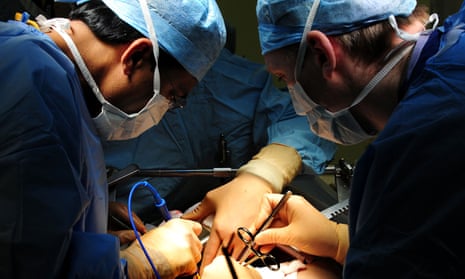I am a surgeon who is well respected in their field, with a long list of awards on my CV. But my greatest achievement is largely a secret: rebuilding my life after I tried to end it.
It has been five years since I was admitted to the intensive care unit (ICU) of the hospital where I work. I had developed severe depression and become convinced that my only way out was to die. When I woke up after my suicide attempt a week later, I had a tube down my throat and the shape of the defibrillator pads burned on to my chest. “We saved you,” the people working there said. I politely thanked them then asked for a ‘not for resuscitation’ form so they wouldn’t try again.
I first realised I was depressed a few months before I tried to kill myself. I had been feeling low for a long time and things began to spiral after the end of a relationship and moving into an apartment alone. I went to see my GP and started taking antidepressants. I booked to see a counsellor.
But the feelings just got worse. I would be smiling and laughing on the outside, but on the inside was a continuous mantra of self-loathing that kept getting louder. I pushed myself harder, took extra shifts, tried to put my head down and just get through it. One day, I had had enough. The pain had become physical as well as mental, and the idea of having to live any longer was unbearable. I took an overdose. My last thoughts were of my family and how much I loved them.
When I woke up and found I was still alive, I was devastated. My memory of the first week is patchy; I was sedated and recovering from pneumonia after having swallowed my own vomit during cardiac arrest. My sister told me I was terrified all the time. I was discharged to my parents’ house and sent to see a psychiatrist. My family looked broken. They tried to smile but they had sat by my bedside and watched my heart stop over and over again. My pain had become their pain.
I was referred to a psychologist and a psychiatrist. I started weekly therapy. I slowly learned to live with my feelings rather than try to suppress them or distract myself with work. It was extremely hard digging through years of painful feelings and memories. Often I would feel worse at the end of a therapy session than I had coming in. But eventually I began to feel better. I found an antidepressant that suited me. I learned how liberating it was to say honestly how I was feeling. I learned how to ask for help and to go easier on myself when I was struggling. I realised just how much my friends and family cared for me and how much they wanted me to get better. This gave me the strength to keep trying.
After a few months, I went back to work, initially part-time and then full-time. There were plenty of challenges. I had to consult on a patient on the same ICU that I had been on. He was 19 and had also tried to end his life. He was brain dead and being assessed for organ donation. His family were devastated. I managed to perform the assessments needed before leaving the room in tears.
Others I knew quietly shared their experience of depression with me. It’s a lot more common in medicine than I had realised. We all face the difficulties of losing patients, long hours and a lack of autonomy. Several of my colleagues confidentially shared that they took antidepressants. Very few had had the opportunity to attend counselling, since this would have required taking time off work. Mental health is still stigmatised, even within the medical profession. I discovered that medical staff often display signs of depression differently to others and keep working right up until they break; work brings comfort from the feelings of hopelessness and worthlessness.
Five years on, I am grateful to be alive. It took a few years before I could say that. I still have bad days, but I live a full life and it doesn’t hurt to be alive anymore. I’ve learned that when times are tough, I need to talk about how I’m feeling. I tell my support network if there are challenges coming up in my life so they know to check in with me more closely. I’d like to think I’ve become a better friend and a better listener. I’ve learned to be more open with people and share the bad times as well as the good ones. The more I have opened up and shown my own vulnerabilities, the more others have felt able to show theirs and we have been able to support one another. I no longer feel alone.
In the UK and Ireland, Samaritans can be contacted on 116 123 or email jo@samaritans.org or jo@samaritans.ie. In the US, the National Suicide Prevention Lifeline is 1-800-273-8255. In Australia, the crisis support service Lifeline is 13 11 14. Other international helplines can be found at www.befrienders.org.
If you would like to contribute to our Blood, sweat and tears series about experiences in healthcare during the coronavirus outbreak, get in touch by emailing sarah.johnson@theguardian.com
